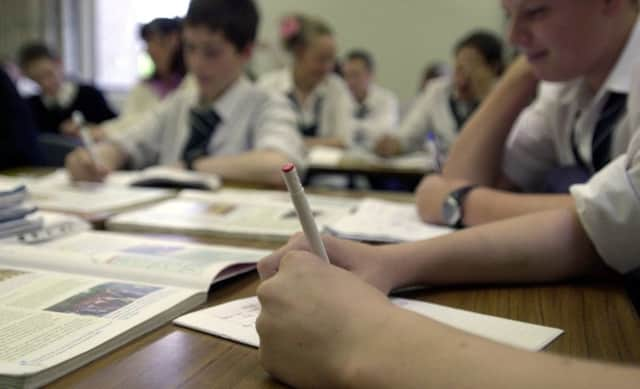Our schools are falling behind the rest of the world - and every major party must share blame: Chris McGovern


Every three years, its Programme for International Student Assessment (PISA) publish test scores that provide the most widely recognised measure of how well pupils across the globe are performing in reading, mathematics and science.
How the UK performs could well influence the voting decisions of many parents and grandparents. The first casualty of warfare, including election battles, tends, sadly, to be truth. It may, therefore, be worth considering the context for what may well turn to be a major general election row.
Advertisement
Hide AdAdvertisement
Hide AdBetween 2006 and 2015, in the PISA test the UK has dropped from 16th to 22nd internationally on literacy, from 23rd to 27th on maths and from 13th to 15th on science.
The unequivocal, if relative, decline in standards of achievement is as stark as it is regrettable. It has happened under Labour governments (1997-2010), a Conservative-Liberal Democrat government (2010-2015) and a Conservative government (2017-present). Too much political point scoring should therefore be discounted when the new scores are published in the run-up to polling day. On the measure that really matters - the one of international comparison – the existing data, based on the 2015 tests, show us to be up to three years behind the most successful education systems around the world. We are, though, amongst the biggest per-head spenders. Very much lower per-head educational spenders, such as Vietnam, Estonia and Poland, out-perform us.
All political parties are committed to spending more on education but they are ignoring the key question. Why is UK per head schooling so expensive and, at the same time, so ineffective compared to many other countries? This is the first educational question we should be asking politicians during the election campaign.
What else do we need to ask them? The scandal of over-recruitment to universities should be addressed. 50 per cent of school leavers are now being persuaded to sign up for degree courses destined to leave many under-employed, disappointed and in considerable debt. Why is the educational establishment allowed to continue to promote money-making academic university courses for youngsters who would be better suited to vocational training and apprenticeships?
Advertisement
Hide AdAdvertisement
Hide AdAnd how long will it take before politicians recognise that the current UK version of comprehensive schooling is not working? As Prime Minister David Cameron once told his party conference, the UK has the worst rate of social mobility in the developed world. This, sadly, is the crowning achievement of our version of comprehensive schooling.
The Social Mobility Commission, chaired by Labour’s Alan Milburn, reported in 2016 that a child living in a disadvantaged area is 27 times more likely to attend an inadequate school than a child living in an advantaged area. Children should be given an equal chance in life regardless of their social background. Electioneering politicians need to be asked what they are going to do in order to reduce comprehensive school selection based on the parents’ ability to buy a house in the ‘right’ catchment area.
And is it not time we allowed children to be taught in line with their aptitude? Once the basics are mastered by around the age of 13, we need alternative but equally good and well-resourced vocational and academic pathways. This could happen within existing comprehensive schools or through a major expansion in the number of grammar schools alongside a new generation of technical schools. Let parents decide at a local level.
By promoting secondary technical/vocational education as an alternative to an academic route, we would be more in line with more successful school systems around the world. We need ‘horses for courses’ schooling system rather the current ‘sheep and goats’ one based only on academic aptitude.
Advertisement
Hide AdAdvertisement
Hide AdFinally, we need to be asking election candidates what they plan to do about teacher-training. Teachers are brain-washed into believing that child-centred-group group work is ‘best practice’. Teacher trainers and too many Ofsted inspectors, are inclined to condemn the alternative approach of teacher-led lessons as old-fashioned and repressive.
In the super-star education systems such as Singapore, Shanghai and South Korea, however, the teacher-led approach is the norm. It allows for calmer, ordered classrooms and better results. Because fewer classroom assistants are necessary, budget pressures are reduced. This means more money to attract and to reward good teachers.
Chris McGovern is chair of the Campaign for Real Education.